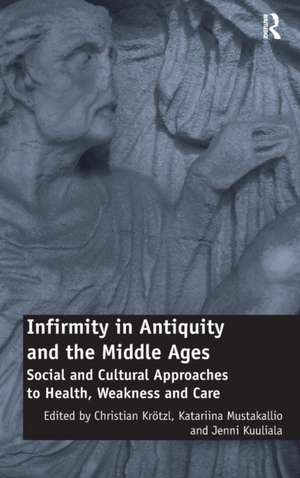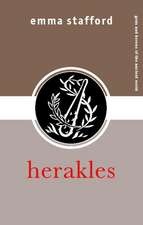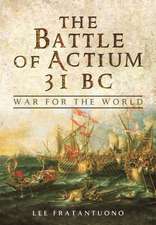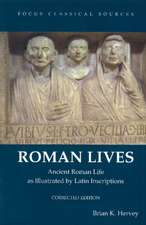Infirmity in Antiquity and the Middle Ages: Social and Cultural Approaches to Health, Weakness and Care
Editat de Christian Krötzl, Katariina Mustakallio, Jenni Kuulialaen Limba Engleză Hardback – 28 oct 2015
| Toate formatele și edițiile | Preț | Express |
|---|---|---|
| Paperback (1) | 389.66 lei 6-8 săpt. | |
| Taylor & Francis – 12 dec 2019 | 389.66 lei 6-8 săpt. | |
| Hardback (1) | 1011.33 lei 6-8 săpt. | |
| Taylor & Francis – 28 oct 2015 | 1011.33 lei 6-8 săpt. |
Preț: 1011.33 lei
Preț vechi: 1233.33 lei
-18% Nou
Puncte Express: 1517
Preț estimativ în valută:
193.53€ • 199.95$ • 160.99£
193.53€ • 199.95$ • 160.99£
Carte tipărită la comandă
Livrare economică 19 martie-02 aprilie
Preluare comenzi: 021 569.72.76
Specificații
ISBN-13: 9781472438348
ISBN-10: 1472438345
Pagini: 334
Dimensiuni: 156 x 234 x 19 mm
Greutate: 0.77 kg
Ediția:Revised
Editura: Taylor & Francis
Colecția Routledge
Locul publicării:Oxford, United Kingdom
ISBN-10: 1472438345
Pagini: 334
Dimensiuni: 156 x 234 x 19 mm
Greutate: 0.77 kg
Ediția:Revised
Editura: Taylor & Francis
Colecția Routledge
Locul publicării:Oxford, United Kingdom
Cuprins
Preface / Introduction: Infirmitas in Antiquity and the Middle Ages, Kuuliala, Mustakallio and Krötzl / Part I Defining Infirmity and Disability: Age, agency and disability: Suetonius and the emperors of the 1st century CE, Harlow and Laurence / Infirmitas or not? Short-statured persons in ancient Greece, Dasen / Performing dis/ability? Constructions of ‘infirmity’ in late medieval and early modern life writing, Frohne / Nobility, community and physical impairment in later medieval canonization processes, Kuuliala / Towards a glossary of depression and psychological distress in ancient Roman culture, Puliga / Part II Societal and Cultural Infirmitas: The crusader's stigmata: true crusading and the wounds of Christ in the crusade ideology of the 13th century, Tamminen / Illness, self-inflicted body pain and supernatural stigmata: three ways of identification with the suffering body of Christ, Klaniczay / Imagery of disease, poison and healing in the late 14th-century polemics against Waldensian heresy, Välimäki / Infirmitas Romana and its cure - Livy’s history therapy in the Ab urbe condita, Mustakallio and Pyy / Part III Infirmity, Healing and Community: From Mithridatium to Potio sancti Pauli: the idea of a medicine from Antiquity to the Middle Ages, Hautala / Alternative medicine in pre-Roman and republican Italy: sacred springs, curative baths and ‘votive religion’, Griffith / Bathing the infirm: water basins in Roman iconography and household contexts, Berg / Sexual incapacity in medieval materia medica, Niiranen / Miracles and the body social: Infirmi in the middle Dutch miracle collection of Our Lady of Amersfoort, Van Mulder / Saints, healing and communities in the later Middle Ages: on roles and perceptions, Krötzl / Bibliography / Index.
Notă biografică
Christian Krotzl, Professor of History at the School of Social Sciences and Humanities, University of Tampere, Finland. Katariina Mustakallio, Dean of the School of Language, Translation and Literary Studies, University of Tampere, Finland. Jenni Kuuliala, Researcher in Medieval History at the University of Bremen, Germany.
Recenzii
'This timely volume brings together papers that were originally presented at a conference on infirmitas held at the University of Tampere, and specially-commissioned essays. The contributors range from established leaders in their fields to new and emerging scholars, throughout maintaining a high standard of investigation into socio-cultural approaches to caring, health and cure. The comparative spirit in which the Passages series of conferences has been held is reflected in the thematic continuities and breaks between antique and medieval, or the syncretism and hiatus of classical, Islamic and medieval Christian medical concepts. Old age, physical disability, and the normative perception of infirmity are just some of the topics scrutinized diachronically and cross-culturally. This approach highlights common threads running through texts and material cultures, while delving into detailed studies of individual case stories and microhistories of physical and mental disease. This collection is highly recommended for anyone interested in the medical humanities and in the pathologising of phenomena.' Irina Metzler, Wellcome Trust Research Fellow, University of Swansea, UK
‘All in all, this is a really interesting interdisciplinary volume. It will provide historians and archaeologists with interests in health and disability with much to think about for some time to come. Hopefully it will open up new avenues of comparative research across traditional chronological boundaries’ - Iona McCleery in Medical History (61:3).
‘All in all, this is a really interesting interdisciplinary volume. It will provide historians and archaeologists with interests in health and disability with much to think about for some time to come. Hopefully it will open up new avenues of comparative research across traditional chronological boundaries’ - Iona McCleery in Medical History (61:3).
Descriere
This volume discusses infirmitas in ancient and medieval societies. It concentrates on the cultural, social and domestic aspects of physical and mental illness, impairment and health, and examines frailty as a more abstract, cultural construct. It seeks to widen our understanding of how physical and mental well-being and weakness were understood and constructed in the longue durée from antiquity to the Middle Ages. The chapters are written by experts from a variety of disciplines, including archaeology, art history and philology, and pay particular attention to the differences of experience due to gender, age and social status.














